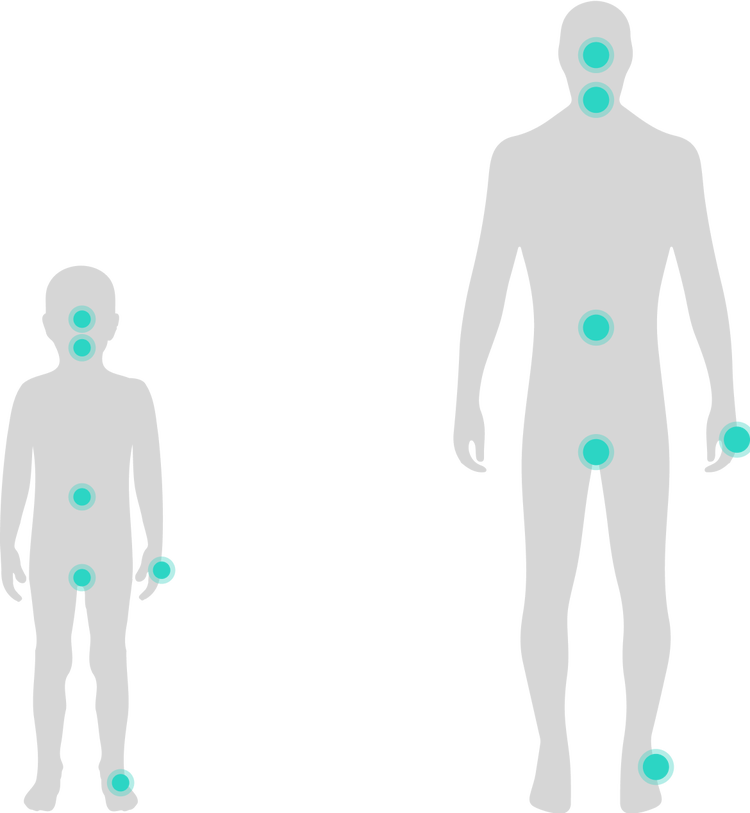How is hereditary angioedema (HAE) impacting your life?

HAE attacks may be unpredictable, debilitating, and life-threatening (throat attacks)
Past attacks do not predict when or where future attacks will occur, including in the airway.
Some people may avoid activities that cause emotional or physical stress—as stress can be a trigger for their attacks. However, as most attacks are unpredictable and not prompted by triggers, medical experts do not recommend avoiding triggers too often as this approach can limit your normal life.
Soraya
Real TAKHZYRO <br/>patient
Common areas affected by HAE attacks
- FACE
- LARYNX
- ABDOMEN
- GENITALS
- HANDS
- FEET

HAE symptoms
Common symptoms of HAE include swelling attacks that can occur anywhere in the body. Many people report feeling this swelling in the face, throat, abdomen, hands, genitals, and feet.
HAE attacks can be painful and sometimes make it difficult to perform everyday tasks. An attack affecting the airway can become life-threatening because of the risk of suffocation.
HAE attack triggers
Some people with HAE have noticed their attacks can be set off by a trigger, such as:
- Emotional stress
- Minor trauma, surgery, or dental procedure
- Infection
- Hormonal influences, like menstruation or using a contraceptive containing estrogen
- Mechanical pressure from physical activities, like mowing the lawn or prolonged use of scissors
- Because HAE can vary from person to person, your triggers might be different from someone else with HAE
The 2020 US Hereditary Angioedema Association (HAEA) guidelines recommend:
- Regular review of any HAE management plan. This includes the consideration of long-term preventive treatment in children and adults
- TAKHZYRO as one of the first-line treatments for long-term prevention of HAE attacks in people 12 years of age and older
Frequently Asked Questions
It can help to know what HAE is, what symptoms to be on the lookout for, and what kind of doctor can help with a diagnosis. The US Hereditary Angioedema Association can help you find an HAE specialist.
To know for certain that you have HAE, a blood test is recommended. Your doctor will measure your levels of two proteins: C4 and C1 esterase inhibitor. Testing can also help to differentiate between HAE Type I and HAE Type II.
Everyone experiences HAE differently, which is why it’s important to work closely with your doctor. They will prescribe the treatment plan they think is best for your specific symptoms.
Generally, there are 2 main types of treatment options:
- Preventive treatment to help prevent or reduce the frequency and severity of attacks
- On-demand treatment is medicine used to treat the symptoms of an HAE attack after it’s started
Even if you're taking preventive treatment like TAKHZYRO, you should keep on-demand treatment nearby (and periodically check to make sure it hasn't expired), so you're prepared to treat if an attack occurs. TAKHZYRO is not on-demand treatment.
Keeping in touch with your doctor about your ongoing symptoms can help ensure you’re getting the right treatment. In fact, the 2020 US Hereditary Angioedema Association (HAEA) guidelines recommend that you and your doctor review the need for long-term preventive treatment at least once per year.
Help prevent attacks before they happen.* Consider preventive treatment with TAKHZYRO.
TAKHZYRO is recommended by the 2020 US Hereditary Angioedema Association (HAEA) guidelines as one of the first-line treatments for long-term prevention of HAE attacks. The 2020 US HAEA guidelines include a consideration of long-term preventive treatment for all HAE patients.
Ask your doctor if TAKHZYRO should be considered as part of your long-term HAE management plan.
*Evaluated in a 6.5-month study and a 2.5-year open-label extension study, TAKHZYRO helped reduce HAE attacks.